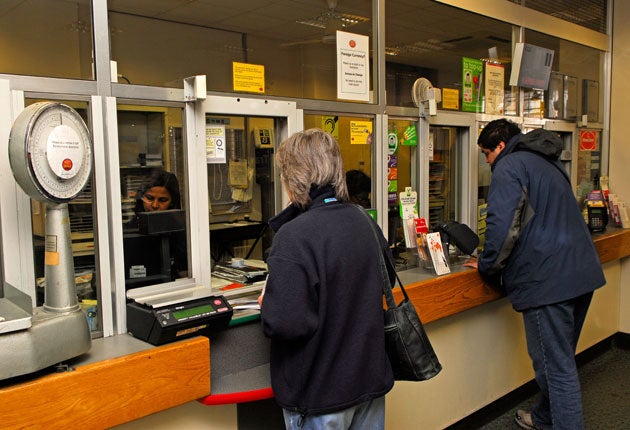
Your support helps us to tell the story
From reproductive rights to climate change to Big Tech, The Independent is on the ground when the story is developing. Whether it's investigating the financials of Elon Musk's pro-Trump PAC or producing our latest documentary, 'The A Word', which shines a light on the American women fighting for reproductive rights, we know how important it is to parse out the facts from the messaging.
At such a critical moment in US history, we need reporters on the ground. Your donation allows us to keep sending journalists to speak to both sides of the story.
The Independent is trusted by Americans across the entire political spectrum. And unlike many other quality news outlets, we choose not to lock Americans out of our reporting and analysis with paywalls. We believe quality journalism should be available to everyone, paid for by those who can afford it.
Your support makes all the difference.Thousands of "bandit barriers" in post offices are to be ripped down in an overhaul of the network to make it more friendly to customers.
More than 2,000 of the reinforced glass "fortresses" are to be removed from smaller post offices, under a scheme backed by ministers which will see postal services incorporated alongside normal tills in shops.
The Government hopes the plans will allow post offices to open longer hours, as well as cutting staff and administration costs. In a pilot scheme, post offices without the screens opened 40 hours a week longer, because shops did not need a separate member of staff behind the screen at all times.
The Postal Affairs Minister, Ed Davey, said he hoped removing the screens – known as bandit barriers and a familiar sight since the 1970s – would help make small post offices profitable again.
"At the moment most of our properties are post offices with a shop attached but in the future they will be a shop with a post office," he said in an interview with The Independent. "If we are going to address the cost issues that post offices face while not repeating the social and economic disaster of just closing post offices left, right and centre, then this is what we have to do."
Mr Davey said security was less of a concern than in the past as many financial transactions previously done by post offices were now done online.
"If you look back in history the fortress was brought in the early 70s as the post office handled more cash and became more vulnerable. If you look at the number of post offices that are held up or robbed today, it is tiny.
"Fortresses can cost £20,000 to install. They also mean a member of staff has to be behind that fortress not able to operate the till in the main shop and it also takes up a lot of space."
Mr Davey said the post offices of the future – called Post Office Locals – would be much more consumer-friendly.
"This is a massive improvement in customer service which people have not seen this from their post office before. It means new people are coming back to the post office, particularly young people, and the idea that the post office is just for the elderly is no longer true. It also means post offices will be able to link into parcel companies to be somewhere you can pick up your parcels. And the queues are less because the post office is open longer. So you no longer need to give up your lunchtime standing in a queue. This is about repositioning the post office as a modern business that actually serves the customer."
The Government is investing £1.34bn in the post office network over the next four years. It has guaranteed that 11,500 will be kept open during this period.
George Thomson, general secretary of the the National Federation of SubPostmasters (NFSP) said: "We welcome the government's substantial investment in the post office network but the NFSP has made clear that if we are to safeguard the future of our cherished national network of post offices, the Government needs to make good on its pledge to transform post offices into the 'front office for government'.
"This should offer a face-to-face complement to web-based services, by providing the full range of local and central government payments, verification and information at post offices."
Join our commenting forum
Join thought-provoking conversations, follow other Independent readers and see their replies
Comments